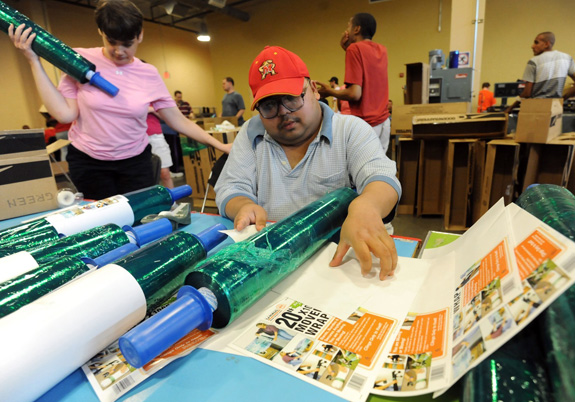Sheltered Workshop Eligibility May Soon Be Limited

Cindy Rankin, 43, left, and Sanjay Singh, 31, put labels on rolls of mover’s stretch wrap in the Opportunity Builders, Inc. warehouse in Millersville, Md. where both receive less than minimum wage for their work. A bill moving through Congress would put limits on young people with disabilities entering such jobs. (Kim Hairston/Baltimore Sun/MCT)
Federal lawmakers are moving forward with a plan to require most students with disabilities to try competitive employment before they could be employed by sheltered workshops.
The U.S. Senate voted 95 to 3 on Wednesday to approve a sweeping jobs bill known as the Workforce Innovation and Opportunity Act. Tucked within the measure are significant changes for students with disabilities transitioning to adulthood.
Chiefly, the bill would prohibit individuals with disabilities age 24 and younger from working in jobs paying less than the federal minimum of $7.25 per hour unless they first try vocational rehabilitation services, among other requirements. There are exceptions, however, for those already working for what’s known as subminimum wage and in cases where individuals are deemed ineligible for vocational rehabilitation.
Advertisement - Continue Reading Below
Beyond limiting who can work for less than minimum wage, the legislation also mandates that state vocational rehabilitation agencies work with schools to provide “pre-employment transition services” to all students with disabilities. What’s more, the agencies must dedicate at least 15 percent of their federal funding to help those with disabilities transition from school to work under the measure.
Practically, lawmakers said the changes will mean that those in special education will be able to access internships and other opportunities to try out different work environments.
“It will help prepare a new generation of young people with disabilities to prepare for, to obtain and succeed in competitive, integrated employment, not substandard, subminimum wage, dead-end jobs, but jobs in which people with disabilities can learn and grow to their maximum potential,” U.S. Sen. Tom Harkin, D-Iowa, said of the bill.
“Basically, we’re going to give persons with disabilities the same supports and experiences that everyone else expects and receives which they haven’t had in the past,” Harkin said.
The legislation is the product of years of negotiating. Last month, members of Congress announced they’d reached a bipartisan, bicameral deal to finally move the measure forward.
The U.S. House of Representatives is expected to take up the workforce bill soon and the White House has signaled its strong support.
Read more stories like this one. Sign up for Disability Scoop's free email newsletter to get the latest developmental disability news sent straight to your inbox.


